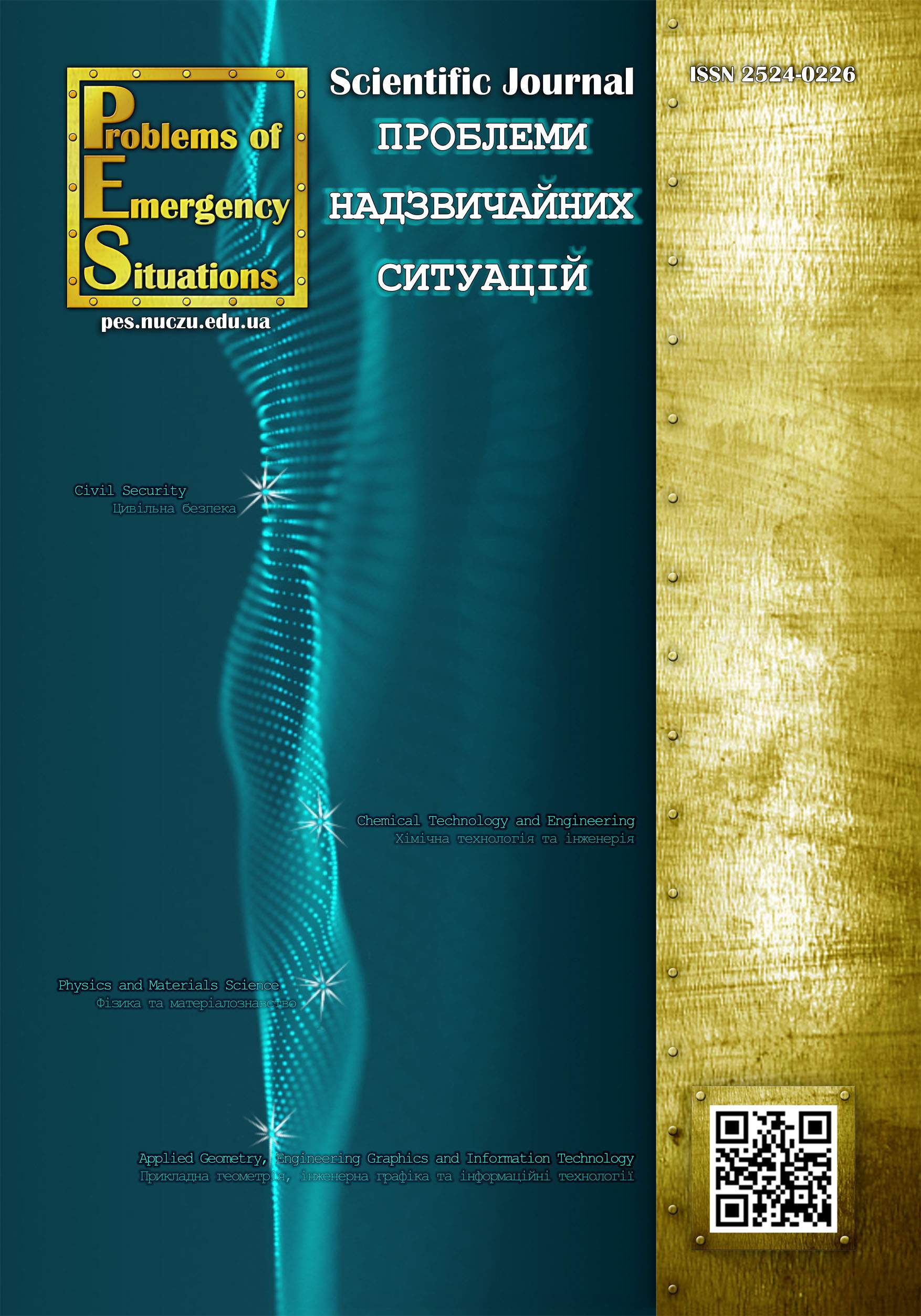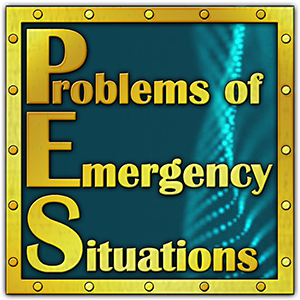Оptimization of the composition of neutral gases for fire extinguishing in museum reservoirs
Ostapov Kostiantyn
National University of Civil Protection of Ukraine
https://orcid.org/0000-0002-1275-741X
Oleksii Chaplyhin
State Emergency Service of Ukraine in the Kharkiv region
http://orcid.org/0009-0005-9818-0277
Lisniak Andrii
National University of Civil Protection of Ukraine
https://orcid.org/0000-0001-5526-1513
Hrytsyna Ihor
National University of Civil Protection of Ukraine
https://orcid.org/0000-0002-2581-1614
Shevchenko Serhii
National University of Civil Protection of Ukraine
https://orcid.org/0000-0002-6740-9252
Kryvoruchko Yevhen
National University of Civil Protection of Ukraine
https://orcid.org/0000-0001-7332-9593
DOI: https://doi.org/10.52363/2524-0226-2024-40-8
Keywords: museum storage facilities, fire extinguishing mixture of neutral gases, architectural, structural and spatial planning solutions, fire protection
Аnnotation
An effective fire extinguishing system has been created for extinguishing fires in museum warehouses with a mixture of neutral gases that do not distort museum artistic values and are able to compete with the best foreign examples of volumetric gas fire extinguishing systems. The proportion of the gas mixture consisting of argon, nitrogen and carbon dioxide has been optimized for fire extinguishing of museum art treasures. Taking into account the requirements of the Montreal Protocol on substances that deplete the ozone layer, an analysis of the state of the issue and the specifics of the solution to the problem of gas extinguishing fires in art museums and their fund storages was carried out. The direction of improvement of the existing automatic volumetric fire extinguishing installations with neutral gases has been determined. An effective and relatively inexpensive composition of a mixture of neutral gases has been developed for use in volume extinguishing of possible fires in fund repositories and museums, which ensures the preservation of material and artistic-aesthetic values without their distortion. Volume fractions of two mixtures of neutral gases № 14 (CO2=50 %, N2=40 %, Ar=10 %) and № 15 (СО2= 40 %, N2=50 %, Ar=10 %) were determined, which are close by its composition and have the best fire-extinguishing efficiency indicators in terms of extinguishing time of the model fire 4.6 s and 4.8 s. A test laboratory stand was created, as an analogue of a volumetric gas fire extinguishing installation with a mixer of the components of the proposed working mixture of neutral gases, on which the indicators of the effectiveness of extinguishing model fires were worked out when extinguishing samples of various fragments of artistic underdrawings on parts of line and Whatman. The technical parameters of the working chamber of the laboratory stand are substantiated, and the rational ratio of pressures filling the stand mixer with components of a mixture of neutral gases is recognized based on its mathematical model, which makes it possible to improve existing industrial installations of various sizes. The price reduction of the proposed neutral gas is justified.
References
- Ostapov, K., Kirichenko, I., Senchykhyn, Y. (2019). Improvement of the installation with an extended barrel of cranked type used for fire extinguishing by gel-forming compositions. Eastern-European Journal of Enterprise Technologies, 4(10(100)), 30–36. doi: 10.15587/1729-4061.2019.174592
- Ostapov, K. et al. (2022). Improving the Quenching of the Undercarriage Space Due to the Adhesive Properties of Gel-Forming Compositions. Key Engineering Materials, 927, 53–62. doi: 10.4028/p-1su80t
- Dubinin et al. (2022). Experimental Investigations of the Thermal Decomposition of Wood at the Time of the Fire in the Premises of Domestic Buildings, Materials Science Forum, 1066, 191–198. doi: 10.4028/p-8258ob
- Kirkwood Clive. (2021). The Fire Disaster in the University of Cape Town’s Jagger Library. Cabo, 1, 40–55. doi: 10.10520/ejc-cabo_v2021_n1_a5
- DBN V. 2. 5-56:2014 Systemy protypozhezhnoho zakhystu.
- Analitychna dovidka pro pozhezhi ta yikh naslidky v Ukraini za 12 misiatsiv 2023 roku. (2024). Instytut derzhavnoho upravlinnia ta naukovykh doslidzhen z tsyvilnoho zakhystu, 39.
- Horobchuk, A. (2024). Pozhezhna bezpeka sakralnykh obiektiv v umovakh voiennoho stanu. Problemy ta perspektyvy rozvytku systemy bezpeky zhyttiediialnosti, 242–244. url: https://sci.ldubgd.edu.ua/handle/123456789/13909
- DSTU EN 15004-1:2014 Statsionarni systemy pozhezhohasinnia. Systemy hazovoho pozhezhohasinnia. Chastyna 1. Proektuvannia, montuvannia ta tekhnichne obsluhovuvannia (EN 15004-1:2008, IDT).
- Dubinin et al. (2020). Investigation of the effect of carbon monoxide on people in case of fire in a building, Ispitivanje djelovanja ugljičnog monoksida na ljude u slučaju požara u zgradi, Sigurnost, 62 (4), 347–357. doi: 10.31306/s.62.4.2
- Qichang Dong, Jiacheng Qi, Song Lu, Long Shi. (2024). Synergistic effects of typical clean gaseous fire-extinguishing agents. Fire Safety Journal, 147, 104206. doi: 10.1016/j.firesaf.2024.104206
- V Abkhazii zghorilo maizhe 4 tysiachi poloten zolotoho fondu natsionalnykh khudozhnykiv: istoriia bahatorichnoho sabotazhu. Available at: https://zaborona.com/v-abhaziyi-zgorilo-majzhe-4-tysyachi-poloten-zolotogo-fondu/
- Російські окупанти розграбували Херсонський художній музей. Available at: https://hromadske.ua/posts/rosijski-okupanti-rozgrabuvali-hersonskij-hudozhnij-muzej
- 119878 Ukraina, MPK A62C31/02. Nasadok prykhovanyi vysuvnyi dlia ustanovok hazovoho pozhezhohasinnia (varianty). Khazova N..; zaiavnyk ta patentovlasnyk OOO «Pozhtekhnika» – a201701105; zaiav. 11.03.2016; opubl. 25.09.2017, Biul. № 18.
- Paul Papas, Changmin Cao, Wookyung Kim, Eli Baldwin, Adam Chattaway. (2023). Fire suppression using trifluoroiodomethane (CF3I)-carbon dioxide (CO2) mixtures. Proceedings of the Combustion Institute, 39, 3, 3765–3773. doi: 10.1016/j.proci.2022.07.257
- Matviienko, V., Kovtun, O. (2014). Konferentsiia storin Videnskoi konventsii pro okhoronu ozonovoho sharu. Ukrainska dyplomatychna entsyklopediia, 1, 760.
- Qi Yang, Jiaqi Zhang, Yu Gao, Xiaomeng Zhou, Haijun Zhang. (2023). Toward better Halon substitutes: Effects of H content on pyrolytic and fire-suppressing mechanisms of ozone-friendly fluorinated alkanes. Journal of Molecular Structure, 1285, 135506. doi: 10.1016/j.molstruc.2023.135506
- John L. Pagliaro, Gregory T. Linteris, Peter B. Sunderland, Patrick T. Baker. (2015). Combustion inhibition and enhancement of premixed methane-air flames by halon replacements. Combustion and Flame, 162, 1, 41–49. doi: 10.1016/j.combustflame.2014.07.006














